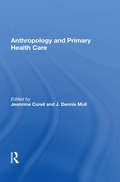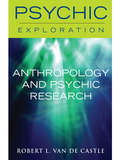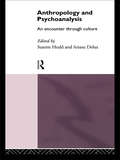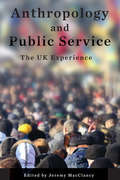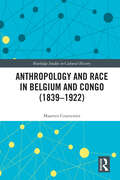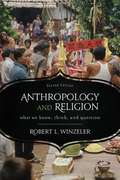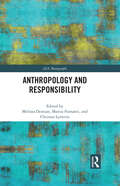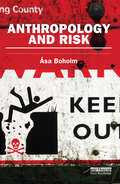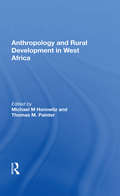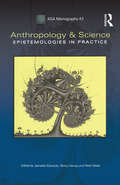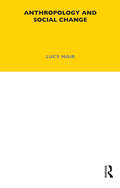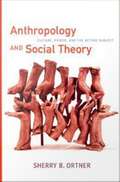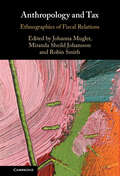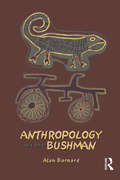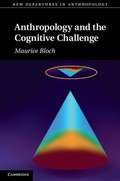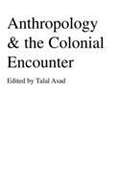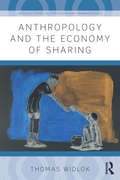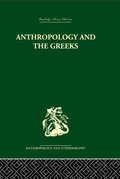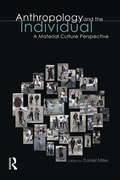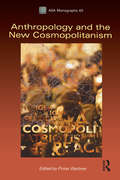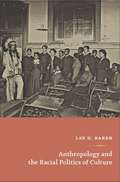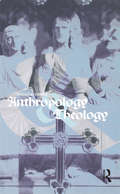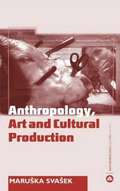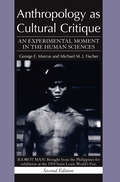- Table View
- List View
Anthropology And Primary Health Care
by Jeannine Coreil J. Dennis MullThis book covers the major theoretical perspectives, content areas, and methodologic approaches that presently characterize the field of anthropology and primary health care. It is of great value to physicians, epidemiologists, program managers, and other international health professionals.
Anthropology and Psychic Research
by Robert L. Van De CastleVery little cross-fertilization of ideas, concepts, or techniques has developed between the fields of anthropology and psychic research. This essay, chapter 11 of Psychic Exploration, reviews several firsthand reports of field observations that offer encouraging anecdotal support for the existence of psi. Also reviewed are the statistically-significant card testing experiments by Foster with American Indians, by the Roses with Australian aborigines, and by the author with Panamanian Indians. The full volume of Psychic Exploration can be purchased as an ebook or paperback version from all major online retailers and at cosimobooks.com.
Anthropology and Psychoanalysis: An Encounter Through Culture
by Suzette Heald Ariane DeluzIn Anthropology and Psychoanalysis the contributors, both practising anthropologists and psychoanalysts, explore in detail the interface between the two disciplines and locate this within the history of both anthropology and psychoanalysis. In particular, they deal with the distinctive reactions of British, French and American anthropology to psychoanalysis and the way in which the present fracturing of each of these national traditions and their post-modern turn has led to a new willingness to investigate the relationships between the disciplines and the role of the unconscious in cultural life. They also address important issues of methodology, and present a critical discussion of the concept of culture and the academic specialisation of knowledge. Anthropology and Psychoanalysis will be invaluable reading to all anthropologists and psychoanalysts.
Anthropology and Public Service: The UK Experience
by Jeremy MacClancyThese days an increasing number of social anthropologists do not find employment within academia. Rather, many find jobs with commercial organizations or in government, where they run research teams and create policy. These scholars provide a much-needed social dimension to government thinking and practice. Anthropology and Public Service shows how anthropologists can set new agendas, and revise old ones in the public sector. Written for scholars and students of various social sciences, these chapters include discussions of anthropologists’ work with the Department for International Development, the Ministry of Defence, the UK Border Agency, and the Cabinet Office, and their contributions to prison governance.
Anthropology and Race in Belgium and the Congo (Routledge Studies in Cultural History)
by Maarten CouttenierThis books examines the history of Belgian physical anthropology in the long nineteenth century and discusses how the notion of ‘race’ structured Belgian pasts and presents as well as relations between metropole and empire. In a context of competing European nationalisms, Belgian anthropologists mainly used physical characters, like skull form and the color of hair and eyes, to delimitate ‘races’, which were believed to be permanent and existent. Their belief in a supposed racial superiority was however above all telling about their own origins and physical characters. Although it is often assumed that these ideas were subsequently transferred to the colony, the case of Belgian colonization in Congo shows that colonial administrators, at least in theory, were reluctant to use the idea of permanent ‘races’ because they needed the possibility of ‘evolution’ to legitimize their actions as part of a ‘civilizing mission’. In reality, however, colonization was based on military occupation and economic exploitation, with devastating effects. This book analyzes how, in this violent context, widespread racial prejudices in fact dehumanized Congolese. This not only allowed colonizers to act inhuman but also reduced Congolese, or their body parts, to objects that could be measured, photographed, casted, and ‘collected’. This volume will be of use to students and scholars alike interested in social and cultural history as well as imperial and colonial history.
Anthropology and Religion
by Robert L. WinzelerDrawing from ethnographic examples found throughout the world, this revised and updated text offers an introduction to what anthropologists know or think about religion, how they have studied it, and how they have interpreted or explained it since the late nineteenth century. Robert Winzeler's balanced consideration of classic topics, basic concepts, and new developments in the anthropological study of religion moves beyond cultural anthropology and ethnography to gather information from physical anthropology, prehistory, and archaeology. Written as a sophisticated but accessible treatment of the issues, Anthropology and Religion is a key text for upper-division courses.
Anthropology and Responsibility (ASA Monographs)
by Melissa Demian Mattia Fumanti Christos LynterisThis book explores the role and implications of responsibility for anthropology, asking how responsibility is recognised and invoked in the world, what relations it draws upon, and how it comes to define notions of the person, institutional practices, ways of knowing and modes of evaluation. The category of responsibility has a long genealogy within the discipline of anthropology and it surfaces in contemporary debates as well as in anthropologists’ collaboration with other disciplines, including when anthropology is applied in fields such as development, medicine, and humanitarian response. As a category that unsettles, challenges and critically engages with political, ethical and epistemological questions, responsibility is central to anthropological theory, ethnographic practice, collaborative research, and applied engagement. With chapters focused on a variety of cultural contexts, this volume considers how anthropology can contribute to a better understanding of responsibility, including the ‘responsibility of anthropology’ and the responsibility of anthropologists to specific others.
Anthropology and Risk (Earthscan Risk in Society)
by Asa BoholmDrawing on theory from anthropology, sociology, organisation studies and philosophy, this book addresses how the perception, communication and management of risk is shaped by culturally informed and socially embedded knowledge and experience. It provides an account of how interpretations of risk in society are conditioned by knowledge claims and cultural assumptions and by the orientationof actors based on roles, norms, expectations, identities, trust and practical rationality within a lived social world. By focusing on agency, social complexity and the production and interpretation of meaning, the book offers a comprehensive and holistic theoretical perspective on risk, based on empirical case studies and ethnographic enquiry. As a selection of Åsa Boholm’s publications throughout her career, along with a newly written introduction overviewing the field, this book provides a unified perspective on risk as a construct shaped by social and cultural contexts.This collection should be of interest to students and scholars of risk communication, risk management, environmental planning, environmental management and environmental and applied anthropology.
Anthropology And Rural Development In West Africa
by Michael M HorowitzAnthropology and Rural Development in West Africa documents the experiences of anthropologists with development in West Africa during the past ten years. It presents case study material to bring out the actual and potential contributions of social science to solving development problems found in Africa and in other parts of the Third World. The book is not a manual that seeks to present solutions; rather it describes some of the kinds of development situations in which anthropologists participated and examines the kind of tensions under which they operated.
Anthropology and Science: Epistemologies in Practice (Asa Monographs)
by Jeanette Edwards; Penny Harvey; Peter WadeWhat does it mean to know something - scientifically, anthropologically, socially? What is the relationship between different forms of knowledge and ways of knowing? How is knowledge mobilised in society and to what ends? Drawing on ethnographic examples from across the world, and from the virtual and global 'places' created by new information technologies, Anthropology and Science presents examples of living and dynamic epistemologies and practices, and of how scientific ways of knowing operate in the world. Authors address the nature of both scientific and experiential knowledge, and look at competing and alternative ideas about what it means to be human. The essays analyze the politics and ethics of positioning 'science', 'culture' or 'society' as authoritative. They explore how certain modes of knowing are made authoritative and command allegiance (or not), and look at scientific and other rationalities - whether these challenge or are compatible with science.
Anthropology and Social Change: Volume 38 (London School Of Economics Monographs On Social Anthropology Ser. #Vol. 38)
by Lucy P. MairThe fourteen lectures and essays that make up this volume deal mainly, though not exclusively, with Africa, and among the topics discussed are land tenure, chieftainship, 'clientship', messianic movement, witchcraft, and 'race, tribalism and nationalism'.
Anthropology and Social Theory: Culture, Power, and the Acting Subject
by Sherry B. OrtnerIn Anthropology and Social Theory the award-winning anthropologist Sherry B. Ortner draws on her longstanding interest in theories of cultural practice to rethink key concepts of culture, agency, and subjectivity for the social sciences of the twenty-first century. The seven theoretical and interpretive essays in this volume each advocate reconfiguring, rather than abandoning, the concept of culture. Similarly, they all suggest that a theory which depends on the interested action of social beings--specifically practice theory, associated especially with the work of Pierre Bourdieu--requires a more developed notion of human agency and a richer conception of human subjectivity. Ortner shows how social theory must both build upon and move beyond classic practice theory in order to understand the contemporary world. Some of the essays reflect explicitly on theoretical concerns: the relationship between agency and power, the problematic quality of ethnographic studies of resistance, and the possibility of producing an anthropology of subjectivity. Others are ethnographic studies that apply Ortner's theoretical framework. In these, she investigates aspects of social class, looking at the relationship between race and middle-class identity in the United States, the often invisible nature of class as a cultural identity and as an analytical category in social inquiry, and the role that public culture and media play in the creation of the class anxieties of Generation X. Written with Ortner's characteristic lucidity, these essays constitute a major statement about the future of social theory from one of the leading anthropologists of our time.
Anthropology and Tax: Ethnographies of Fiscal Relations
by Johanna Mugler Miranda Sheild Johansson Robin SmithFrom the perspective of individual taxpayers to international tax norm negotiators, the anthropologists in this collection explore how taxes shape our world: our social relationships and value regimes, how we exclude and include, the categories we think with, and the way we share with each other. A first of its kind, it presents an anthropological discussion about tax rooted in ethnographic work. It asks fundamental questions such as: what is tax, what is taxable, and what do taxes do? By forwarding multiple perspectives from around the world about fiscal systems and how they are experienced and constituted, Anthropology and Tax reconceptualises tax in society. In doing so, this volume makes an incisive intervention in what might be one of the most important debates of our time – that of fiscal sociality. This title is also available as Open Access on Cambridge Core.
Anthropology and the Bushman
by Alan BarnardThe Bushman' is a perennial but changing image. The transformation of that image is important. It symbolizes the perception of Bushman or San society, of the ideas and values of ethnographers who have worked with Bushman peoples, and those of other anthropologists who use this work. Anthropology and the Bushman covers early travellers and settlers, classic nineteenth and twentieth-century ethnographers, North American and Japanese ecological traditions, the approaches of African ethnographers, and recent work on advocacy and social development. It reveals the impact of Bushman studies on anthropology and on the public. The book highlights how Bushman or San ethnography has contributed to anthropological controversy, for example in the debates on the degree of incorporation of San society within the wider political economy, and on the validity of the case for 'indigenous rights' as a special kind of human rights. Examining the changing image of the Bushman, Barnard provides a new contribution to an established anthropology debate.
Anthropology and the Cognitive Challenge
by Maurice BlochIn this provocative new study one of the world's most distinguished anthropologists proposes that an understanding of cognitive science enriches, rather than threatens, the work of social scientists. Maurice Bloch argues for a naturalist approach to social and cultural anthropology, introducing developments in cognitive sciences such as psychology and neurology and exploring the relevance of these developments for central anthropological concerns: the person or the self, cosmology, kinship, memory and globalisation. Opening with an exploration of the history of anthropology, Bloch shows why and how naturalist approaches were abandoned and argues that these once valid reasons are no longer relevant. Bloch then shows how such subjects as the self, memory and the conceptualisation of time benefit from being simultaneously approached with the tools of social and cognitive science. Anthropology and the Cognitive Challenge will stimulate fresh debate among scholars and students across a wide range of disciplines.
Anthropology and the Colonial Encounter
by Talal AsadThe papers in this book analyze and document ways in which anthropological thinking and practice have been affected by British colonialism. They approach this topic from different points of view and at different levels. Each stands as an original contribution to an argument which is only just beginning.
Anthropology and the Economy of Sharing (Critical Topics in Contemporary Anthropology)
by Thomas WidlokThis book examines the economy of sharing in a variety of social and political contexts around the world, with consideration given to the role of sharing in relation to social order and social change, political power, group formation, individual networks and concepts of personhood. Widlok advocates a refreshingly broad comparative approach to our understanding of sharing, with a rich range of material from hunter-gatherer ethnography alongside debates and empirical illustrations from globalized society, helping students to avoid Western economic bias in their thinking. Anthropology and the Economy of Sharing also demonstrates that sharing is distinct from gift-giving, exchange and reciprocity, which have become dominant themes in economic anthropology, and suggests that a new focus on sharing will have significant repercussions for anthropological theory. Breaking new ground in this key topic, this volume provides students with a coherent and accessible overview of the economy of sharing from an anthropological perspective.
Anthropology and the Greeks (Routledge Library Editions)
by S.C. HumphreysThe first section of the book deals with the history of the relationship of classical studies and anthropology. In the second section the more material aspects of ancient Greek life are considered and the author relates the economic history of the period to new approaches in archaeology and economic anthropology. The place of kinship in the social structure of the Greek city-state; the social factors involved in the genesis of Greek philosophy; and the structural and institutional components of 'freedom' in classical Athens are all examined. First published in 1978.
Anthropology and the Individual: A Material Culture Perspective (Materializing Culture)
by Daniel MillerAnthropology is usually associated with the study of society, but the anthropologist must also understand people as individuals. This highly original study demonstrates how methods of social analysis can be applied to the individual, while remaining entirely distinct from psychology and other perspectives on the person. Contributors draw on approaches from material culture to create fascinating portraits of individuals, offering analytical insights that convey ethnographic encounters with often extraordinary people from Turkey, Spain and Britain to Albania, Cuba, Jamaica, Mali, Serbia and Trinidad. Exploring relationships to places and spaces such as social networking sites, to persons such as parents, to ethical concerns such as fairness and to concepts such as the ideology of struggle, Anthropology and the Individual shows how the study of the individual can provide insights into society without losing a sense of the particularity of the person.
Anthropology and the New Cosmopolitanism: Rooted, Feminist and Vernacular Perspectives (Association Of Social Anthropologists Monographs)
by Pnina WerbnerAnthropology and the New Cosmopolitanism inaugurates a new, situated, cosmopolitan anthropology. It examines the rise of postcolonial movements responsive to global rights movements, which espouse a politics of dignity, cultural difference, democracy, dissent and tolerance. The book starts from the premise that cosmopolitanism is not, and never has been, a 'western', elitist ideal exclusively. The book's major innovation is to show the way cosmopolitans beyond the North--in Papua New Guinea, Indonesia and Malaysia, India, Africa, the Middle East and Mexico--juggle universalist commitments with roots in local cultural milieus and particular communities.Anthropology and the New Cosmopolitanism breaks new ground in theorizing the role of social anthropology as a discipline that engages with the moral, economic, legal and political transformations and dislocations of a globalizing world. It introduces the reader to key debates surrounding cosmopolitanism in the social sciences, and is written clearly and accessibly for undergraduates in anthropology and related subjects.
Anthropology and the Racial Politics of Culture
by Lee D. BakerIn the late nineteenth century, if ethnologists in the United States recognized African American culture, they often perceived it as something to be overcome and left behind. At the same time, they were committed to salvaging "disappearing" Native American culture by curating objects, narrating practices, and recording languages. In Anthropology and the Racial Politics of Culture, Lee D. Baker examines theories of race and culture developed by American anthropologists during the late nineteenth century and early twentieth. He investigates the role that ethnologists played in creating a racial politics of culture in which Indians had a culture worthy of preservation and exhibition while African Americans did not. Baker argues that the concept of culture developed by ethnologists to understand American Indian languages and customs in the nineteenth century formed the basis of the anthropological concept of race eventually used to confront "the Negro problem" in the twentieth century. As he explores the implications of anthropology's different approaches to African Americans and Native Americans, and the field's different but overlapping theories of race and culture, Baker delves into the careers of prominent anthropologists and ethnologists, including James Mooney Jr. , Frederic W. Putnam, Daniel G. Brinton, and Franz Boas. His analysis takes into account not only scientific societies, journals, museums, and universities, but also the development of sociology in the United States, African American and Native American activists and intellectuals, philanthropy, the media, and government entities from the Bureau of Indian Affairs to the Supreme Court. In Anthropology and the Racial Politics of Culture, Baker tells how anthropology has both responded to and helped shape ideas about race and culture in the United States, and how its ideas have been appropriated (and misappropriated) to wildly different ends.
Anthropology and Theology
by Douglas DaviesAnthropology and Christian Theology have traditionally interpreted religion in quite different ways and have often been thought of as hostile to one another. In fact, a fundamental concern for human experience lies at the heart of both disciplines. This innovative book takes a new look at key anthropological and theological themes, and explores the intricacies of their interplay throughout history and in the present. Sacrifice, embodiment, ritual, incarnation, symbolism, gift and power are all related in ways that shed new light on religious behaviour and belief. Detailed analysis of fundamental Christian rites shows how they help generate emotional meaning and inspire philosophical ideas, and demonstrates how the body serves as a vehicle for religious beliefs. Through an examination of these issues and much more, Davies reveals how religious rituals help people to become secure in their sense of identity. This accessible foray into new territory is essential reading for anthropologists, theologians, or anyone interested in religion who is seeking new interpretations of familiar themes.
Anthropology, Art and Cultural Production
by Maruska SvasekThis book provides an introduction to anthropological perspectives on art. Svasek defines art as a social process. We study not only the artefacts themselves and the values attributed to them, but also the process of production and its wider context. Providing a critical overview of various anthropological theories of art, Svasek offers a new perspective which centres on the analysis of commoditisation, aestheticisation and object agency. She explores the process of collecting and exhibiting art works and how this relates to art's production, distribution and consumption in an increasingly global market. The book outlines the significance of art and aesthetics in everyday life, and examines the shifting boundaries between art and other categories such as kitsch, souvenirs, propaganda and pornography. Finally, Svasek argues for an anthropological perspective that links the production and consumption of artefacts to political, religious and other cultural processes. Ideal as a teaching text, this book gives a detailed overview of themes that are central to the fields of art history, art sociology and cultural studies.
Anthropology as Cultural Critique: An Experimental Moment in The Human Sciences, Second Edition
by George E. Marcus Michael M. J. FischerUsing cultural anthropology to analyze debates that reverberate throughout the human sciences, George E. Marcus and Michael M. J. Fischer look closely at cultural anthropology's past accomplishments, its current predicaments, its future direction, and the insights it has to offer other fields of study. The result is a provocative work that is important for scholars interested in a critical approach to social science, art, literature, and history, as well as anthropology. This second edition considers new challenges to the field which have arisen since the book's original publication.
Anthropology as Cultural Critique: An Experimental Moment in the Human Sciences
by George E. Marcus Michael M.J. FischerUsing cultural anthropology to analyze debates that reverberate throughout the human sciences, George E. Marcus and Michael M. J. Fischer look closely at cultural anthropology's past accomplishments, its current predicaments, its future direction, and the insights it has to offer other fields of study. The result is a provocative work that is important for scholars interested in a critical approach to social science, art, literature, and history, as well as anthropology. This second edition considers new challenges to the field which have arisen since the book's original publication.
